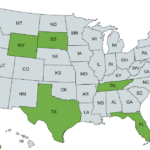Many expats assume moving abroad means they don’t have to file state taxes. Unfortunately, it’s not always that simple. New York is one of several states that make it difficult for former residents to sever tax obligations. If you lived in New York before moving overseas — or you maintain certain ties there — you may need to file, and potentially pay, New York state income taxes.
Below, we’ll go over in detail who exactly is subject to taxation in New York, how the state taxes residents, how to potentially change your state residency, and more.
Key Updates for 2025
- Tax rates unchanged: NY income tax still ranges from 4% to 10.9%.
- Standard deduction: Remains $8,000 (single) and $16,050 (married filing jointly).
- High tax burden: NY residents still face one of the highest tax burdens in the U.S.
State tax liability for US expats
All American citizens and permanent residents who earn above a certain threshold must file federal income taxes — even if they live abroad. Whether or not expats need to file state taxes usually depends on where they most recently lived, which financial and social ties they maintain to a given state, and state residency definitions.
In rare cases, expats may even need to pay state and local taxes.
Understanding state residency requirements
Every state has slightly different tax residency definitions, but the majority won’t consider former residents who move abroad to be tax residents unless they maintain significant ties, such as:
- Being domiciled in the state (i.e. owning a permanent home)
- Having a business registered there
- Maintaining certain financial interests (e.g. primary bank accounts)
- Spending more than half of the tax year in the state
- Frequently returning for long stays
- Physically working in the state, or earning income sourced from the state (e.g. income from a rental property located in the state)
- Having dependents or immediate family members living in the state
In such states, expats without major ties can end their tax obligations by filing a part-year tax return the year they move abroad. Even if states don’t require you to supply proof of your move, you should keep it on hand in case the state tax authority reaches out. This might include:
- A foreign residence card
- A signed rental contract in your country of residence
- A foreign tax return
That said, each state has slightly different tax residence rules, so it’s worth researching the laws of the state or states most relevant to you. You may also want to consider contacting a tax professional to help you sever ties appropriately.
What is a sticky state?
Unfortunately, some states make it much more difficult for former residents to free themselves of their tax obligations. As you may have guessed, New York is one of these “sticky states” — along with California, New Mexico, South Carolina, and Virginia. What’s more, New York is particularly aggressive in auditing expats to ensure they aren’t evading their state tax obligations.
New York state tax obligations for expats
New York’s Department of Taxation and Finance requires residents, part-year residents, and certain nonresidents with New York-sourced income to file state taxes.
New York state tax residency definition
New York defines residents as those who:
- Are domiciled in New York (i.e. own a true, permanent home there), OR
- Have a permanent place of abode in the state of New York for all of the tax year, AND spend 184 days or more in the state during the tax year
Pro Tip:
The state defines a “permanent place of abode” as a residence that you permanently maintain — whether you own it or not — that is suitable for year-round use. A spouse’s condo located in Utica, for example, would count as a permanent place of abode
However, there are exceptions for two groups of people: Group A and Group B. Those who fall into either of these groups are not considered New York residents for state tax purposes.
Group A includes those who:
- Didn’t maintain a permanent place of abode in New York during the tax year, AND
- Maintained a permanent place of abode outside of New York for the entire tax year, AND
- Spent 30 days or less in the state of New York during the tax year
Group B includes those who:
- Were in a foreign country for at least 450 days of any period of 548 consecutive days overlapping the tax year, AND
- Had their spouse and minor children spend 90 days or less in the state of New York throughout this 548-day period, AND
- Were present in the state of New York for no more days than the ratio of the number of nonresident days multiplied by 90 to 548
This last point reads a bit confusing, so let’s bring it to life with a concrete example.
Example: Sebastian meets the definition of New York state tax residency because he maintains a permanent home in New York. However, he has spent the last two years in the Netherlands for a temporary work assignment. In the last 548 days, he, his wife, and his eleven-year-old daughter have spent 527 days in the Netherlands and 21 days in New York.
Using the formula mentioned above, we’ll calculate the maximum number of days he can spend in New York without being a tax resident:
- The number of nonresident days (527) divided by 548 is .096167883
- .096167883 multiplied by 90 is about 87
We can see that the number of days he has spent in New York (21) is significantly less than the maximum amount he can spend there (87). As such, Sebastian qualifies as a nonresident under the Group B exception.
New York filing requirements for residents
Residents who meet any of the conditions below must file a New York state tax return:
- You have a federal return filing requirement
- You don’t have to file a federal return, but your federal adjusted gross income (AGI) plus New York additions exceeded $4,000 (or $3,100 if you are single and can be claimed as a dependent on another taxpayer’s federal return)
- You want to claim a refund on income tax withheld from your pay by the state of New York, New York City, or Yonkers
- You want to claim refundable or carryover credits
Filing requirements for nonresidents in New York
Those who did not meet the New York tax resident definition at any point in the year qualify as nonresidents. Nonresidents must file if they meet any of the following criteria:
- You have New York-sourced income, and your New York AGI federal amount column (Form IT-203, line 31) exceeds your New York standard deduction ($3,100 to $16,050 for tax year 2024, depending on filing status)
- You want to claim a refund on income tax withheld from your pay by the state of New York, New York City, or Yonkers
- You want to claim refundable or carryover credits
- You had a net operating loss for New York State personal income tax purposes, but not for federal income tax purposes
Part-year residents in New York: Filing requirements
Those who met the New York tax resident definition for part of the year and the nonresident definition for the rest of the year qualify as part-year residents. Part-year residents must file if they meet any of the following criteria:
- You received any income during your resident period or you had New York-sourced income during your nonresident period and your New York AGI federal amount column (Form IT-203, line 31) exceeds your New York standard deduction (again, $3,100 to $16,050)
- You want to claim a refund on income tax withheld from your pay by the state of New York, New York City, or Yonkers
- You want to claim refundable or carryover credits
- You are subject to a separate tax on lump-sum distributions derived from or connected with New York sources during your resident period
- You had a net operating loss for New York State personal income tax purposes, but not for federal income tax purposes
Pro Tip
B!T note: Residents of New York City or Yonkers — or nonresidents/part-year residents with income sourced from there — may face additional filing requirements and local tax rates.
New York state income tax rates for 2024-2025
So how much are New York state income taxes?
If your income is $65,000 or less, you can use the simplified 2024 New York State Tax Tables to calculate your New York state income tax liability. Otherwise, you will pay taxes at the following rates:
| Income – Single filers/Married filing separately | Income – Married filing jointly/Qualifying widow(er) | Income – Head of household | Tax rate |
| Up to $8,500 | Up to $17,150 | Up to $12,800 | 4% |
| $8,501 – $11,700 | $17,151 – $23,600 | $12,801 – $17,650 | 4.5% |
| $11,701 – $13,900 | $23,601 – $27,900 | $17,651 – $20,900 | 5.25% |
| $13,901 – $80,650 | $27,901 – $161,550 | $20,901 – $107,650 | 5.5% |
| $80,651 – $215,400 | $161,551 – $323,200 | $107,651 – $269,300 | 6% |
| $215,401 – $1,077,550 | $323,201 – $2,155,350 | $269,301 – $1,616,450 | 6.85% |
| $1,077,551 – $5,000,000 | $2,155,351 – $5,000,000 | $1,616,451 – $5,000,000 | 9.65% |
| $5,000,001 – $25,000,000 | $5,000,001 – $25,000,000 | $5,000,001 – $25,000,000 | 10.3% |
| $25,000,001+ | $25,000,001+ | $25,000,001+ | 10.9% |
Source: Nerdwallet
Note that the tax rates above are marginal tax rates, which function differently than effective tax rates. With marginal tax rates, different tax rates apply to different income tax brackets.
Let’s say, for example, that you’re a single filer who had an income of $100,000 in 2024. While your top marginal state tax rate will be 6%, you don’t have to pay 6% of your income in state taxes.
Rather, you will pay:
- A 4% tax on the portion of your income up to $8,500
- A 4.5% tax on the portion of your income between $8,501 and $11,700
- A 5.25% tax on the portion of your income between $11,701 and $13,900
- A 5.5% tax on the portion of your income between $13,901 and $80,650
- A 6% tax on the portion of your income between $80,651 and $100,000
Additional taxes you may need to pay in New York include:
- Property taxes: Property tax rates in New York vary by location, but the average is 1.62%
- State sales tax: The New York state sales tax is 4% on most items, although local sales taxes may apply as well. New York City, for example, has sales tax rates of 4.5% to 10.375% depending on the category
- Estate tax: New York’s estate tax varies from 3.06% to 16%, depending on the value of the estate
New York tax deductions, credits, & exemptions
You may be able to reduce your New York state income tax liability through state-specific tax breaks. A few of the most popular options include:
- Standard deduction: From $3,100 to $16,050, depending on filing status and circumstances
- Itemized deductions: Generally, most itemized deductions you can claim on your federal tax return can be claimed on your New York state income taxes as well
- Empire State child credit: Up to 33% of the federal Child Tax Credit or $100 per qualifying child (whichever is greater)
- College tuition credit: Up to $400 when paying for yourself, a spouse, or a dependent to attend a New York state college or institution of higher learning
Long-term care insurance credit: Up to $1,500 for individuals or up to 20% of premiums for businesses paying long-term care insurance
Income tax filing procedures for expats from New York
Those who must file New York state tax returns for tax year 2024 do so in calendar year 2025. For expats, the New York state income tax deadline for the 2024 tax year is June 16th, 2025. If you need more time, you can request an extension before the deadline, which will modify your due date to October 15th, 2025.
However, you must still make an estimated tax payment by the original due date to avoid late penalties and interest.
New York state-specific tax forms
The exact form you must file for your New York state income tax return depends on your filing status:
- Residents: Form IT-201
- Nonresidents & part-year residents: Form IT-203
- Memberships of a partnership: Form IT-204
- Note: Partnerships with nonresident partners may file a single group return for the entire partnership with Form IT-203-GR
Pro Tip:
Executors, trustees, and administrators of New York-based trusts and estates must file Form IT-205 (aka a fiduciary income tax return).
Filing New York state tax forms, step by step
Regardless of which form you fill out, you will need to:
- Enter your basic information (e.g. full legal name, address, Social Security Number/SSN, filing status)
- State how much time you spent in vs. outside of New York
- List your dependents’ names, birth dates, and SSNs, as well as describe your relationship to them (e.g. child, spouse, parent, etc.)
- Report your income across different categories (e.g. wages/salary, taxable interest, ordinary dividends, rental income, capital gains or losses, etc.)
- Factor in state-specific income additions (e.g. interest on local bonds, distributions from New York’s 529 college savings program distributions, public employee 414[h] retirement contributions)
- Factor in state-specific subtractions (e.g. state and local tax breaks, government pension contributions)
- Indicate which state-specific and local tax credits, deductions, and exclusions you want to claim and calculate their value
- Calculate the amount you owe or the amount you are refunded
- Sign your tax return
There are a few different ways to file your New York state income tax return:
- Hiring a tax professional to file on your behalf
- Filing through tax software
- Note: Some tax software programs don’t facilitate expat returns in certain circumstances, such as if they’re married to a non-US national and filing separately from them
- Filing online for free, if you qualify
- Completing the form, printing, and mailing it
If you will be including a payment (e.g. check or money order) along with the printed copy of your tax return, you must mail it to:
STATE PROCESSING CENTER
PO BOX 15555
ALBANY NY 12212-5555
If you won’t be including a payment, you’ll mail your return to:
STATE PROCESSING CENTER
PO BOX 61000
ALBANY NY 12261-0001
Should you change your New York state residency?
If you’re a New York state resident, you may benefit from changing your residence to a state with lower taxes and fewer filing requirements. There are nine states with no state income taxes:
- Alaska
- Florida
- Nevada
- New Hampshire
- Note: While New Hampshire taxed dividends and interest for many years, that tax has been repealed as of the 2025 tax year — aka the taxes you file in 2026
- South Dakota
- Texas
- Washington
- Note: Washington does levy a state tax on capital gains
- Wyoming
However, changing state residence may not be the right option for everyone. For example, it may not make sense to do so if you plan on eventually moving back to New York. When in doubt, consult a tax professional who specializes in expat taxes.
How to establish residency in a more favorable state
In cases where changing state residence is beneficial, you’ll generally need to sever your existing ties to New York. A few ways you might do so include:
- Selling any New York-based real estate or property you own
- Closing financial accounts based in New York
- Changing the registration of any New York-based businesses
- Limiting the amount of time you and your family spend in New York
- Working from outside the state
You’ll also need to establish ties to your desired state. You might do this by:
- Buying or renting real estate
- Registering your vehicle
- Moving your belongings
- Applying for a driver’s license or official ID in the state
- Registering your business
- Registering to vote
- Spending more time in the state
- Opening financial accounts
- Filing a change-of-address form
Whichever changes you make, be sure to document them in case of an audit. Tax preparers or lawyers may suggest different or additional measures based on your specific case.
Frequently Asked Questions
-
How does New York State tax my foreign-earned income?
If you qualify as a New York state tax resident, you must pay taxes on your worldwide income, including foreign earnings. Nonresidents, however, are subject to taxation only on their New York-sourced income (e.g. rental from a property located in New York).
New York levies state income taxes at a rate of 4% to 10.9%, depending on your overall taxable income.
-
What are the residency rules for New York State, and how do they apply to me as an expat?
New York has two main state tax resident definitions:
- Someone who maintains a true permanent home in the state of New York
- Someone who has a permanent place of abode (i.e. a permanent home they could move to at any time, even if they don’t own it) in New York, AND spends at least 184 days per year in the state
Even if you meet the New York state tax residency definition, though, you may be able to get an exemption. Exemptions depend on factors like whether you maintain a permanent place of abode outside of New York and how much time you and your family spend outside of New York.
-
How can I avoid double taxation between New York State and my host country?
If you live in certain parts of Canada, you may be able to file Forms IT-112-R or IT-112-C to receive a tax credit for taxes paid to the provincial or national Canadian government. However, this state tax credit is not available to those who live in other countries.
Other ways to reduce your New York state income taxes include claiming the New York standard deduction, itemized deductions, or state-specific tax credits.
B!T tip: The Foreign Tax Credit also gives you federal (but not state) US tax credits for any income taxes you’ve paid to a foreign government. If there is a tax treaty between your country of residence and the US, you may be able to claim additional benefits on your federal US taxes.
-
What deductions and credits can I claim on my New York State tax return as an expat?
A few common tax credits and deductions you can claim on your New York state tax return include:
- A standard deduction of $3,100 to $16,050 for tax year 2024 (aka the taxes you file in 2025), depending on filing status
- Most of the same tax deductions as you would make on your federal tax return
- The Empire State child credit
- The college tuition credit for tuition you pay for yourself, your spouse, or a dependent to attend a state college or higher learning institution
- A credit for long-term care insurance premiums
-
I lived in New York for part of the year but moved abroad, how do I file my taxes?
Part-year tax residents of New York must file Form IT-203. You can have a tax professional file this return on your behalf, file it yourself online, or complete, print, and mail it in.
Note that part-year residents are subject to New York State taxes on:
- Their worldwide income during any part of the year they qualified as a tax resident
- Their New York-sourced income only during any part of the year they no longer qualified as a tax resident
-
6. How does owning property in New York affect my state tax obligations as an expat?
Maintaining a true, permanent home in New York or having a permanent place of abode in New York and spending 184 days or more per year there may qualify you as a state tax resident. In turn, this may require you to file a New York state tax return and pay New York state income taxes on your worldwide income.
And even if you’re a nonresident, you will almost certainly need to pay New York state income taxes if you earn rental income from property located in New York.
-
How can I prepare for future New York State tax changes as an expat?
Tax laws and rules can change frequently — especially if you’re an expat. The best way to stay on top of changes is by working with an expat tax professional like the ones at Bright!Tax, as their jobs require them to research and understand the latest tax updates.
Outside of that, you can reference the Bright!Tax blog to learn about the latest, most critical tax updates for US expats!

 Connect on LinkedIn
Connect on LinkedIn









